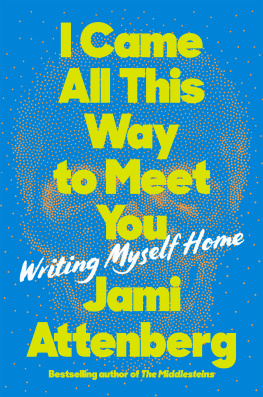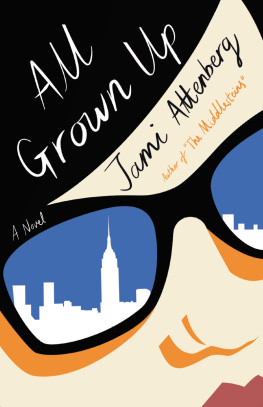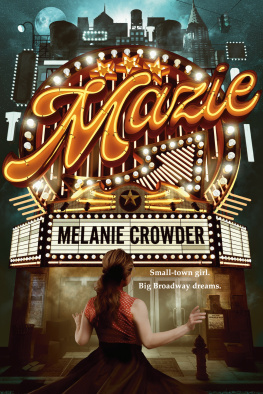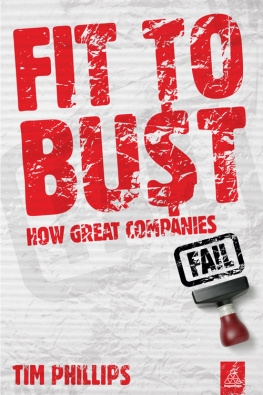Jami Attenberg
Saint Mazie
Mazies Diary, March 9, 1939
Fannie brought one of her fancy friends down to the theater last night. First she handed me a beer then she had me shake his hand. Bribery. He gave me a cigarette, the first one Ive had in weeks. It tasted as good as I remembered. All of these things Im not supposed to be having and there I was, having them. Rosie would kill me. We smoked for a minute, shooting the breeze. Then the fella told me he was there on a mission and he wouldnt take no for an answer. He wanted me to write a book about my life.
I said: Who cares about my life? I just sit in this ticket booth all day.
And he said: Plenty of people care, you run these streets.
Fannie stood back, quiet, unlike usual. She was watching the both of us, or maybe it was only him. She likes these young boys around, and I guess I cant blame her. Ill hand this one a few points for his looks. He was real slick, tan, a Mediterranean fella in a bespoke suit. Hes twenty-five if a day, but it didnt matter, he carried himself like hed known everything about life since birth. It must be so easy to have all the answers already. It must be so easy to think you know the truth.
I said: Im not so interesting. Its the bums that have the real story.
And he said: No, the bums are interesting because of you.
If he cant see why theyre worth talking about, then what kind of story would he want me to tell? Ten years of my life Ive been helping those bums, I couldnt ignore them. And this guy, with his suit and his hair and his eyes, he wants me to forget their names.
I started closing up shop. Counting the change Id already counted, just so hed get the hint.
Fannie said: Im sorry I brought him here.
I said: Everyones welcome at the Venice Theater, even the snobs.
He said: You have a story to tell. Im never wrong about these things. Youre the queen, so tell the story of your kingdom.
That cigarette was perched on his lips like it was part of his flesh. I wanted a hundred more of them but the doc says no. He slid his hand through the slot of the cage before he left. We shook, but then we still kept holding hands, and it made me feel young again under my skin, like I was a piece of ice melting in the sun. Just a pool of me left behind. We stood there like that. He held my hand, I held his.
Im a sucker. An old lady. A fool.
He said: Think about it.
Then this morning I dug you out of the closet and dusted you off. So all right, Im thinking about it.
1. Excerpt from the unpublished autobiography of Mazie Phillips-Gordon
People ask me why I spend so much time on the streets. I tell them its where I grew up. These streets are dirty, but theyre home, and theyre beautiful to me. The bums know about the beauty of it. The bums love it like its their own skin. The ruddy dust from the streets, the mud in the parks where they sleep, sunk deep in the lines in their foreheads, jammed up under their fingernails. The sun and the dirt mixed up with their sweat and the booze. All the dirt. Its the earth. If you cant see the beauty in the dirt then I feel sorry for you. And if you cant see why these streets are special, then just go home already.
George Flicker, Mazies neighbor, 285 Grand Street
Before she was the Queen of the Bowery, walking around in those brilliantly colored dresses, with her floppy felt hat and dangling bracelets and walking stick, helping all those homeless men for years and years, and before people started writing about her in magazines and newspapers, calling her an important New Yorker, a hero is what they said, before all that, she was just Mazie Phillips, the girl who lived upstairs from me who maybe I had a little crush on but wouldnt give me the time of day.
Mazies Diary, November 1, 1907
Today is my birthday. I am ten. You are my present.
I am the daughter of Ada and Horvath Phillips. But they live in Boston, far away. I never see them anymore. So are they still my parents? I dont care. My father is a rat and my mother is a simp.
I live in New York now. Rosie says I am a New Yorker. You are my New York diary.
George Flicker
First it was just Louis Gordon in the one big apartment on the third floor, alone for a long time, I remember. He was a giant man, filled with red meat. You could smell it in the hallway. Him cooking it, I mean. And he was a sweaty man, too. Dead of winter, hed be sweat-stained before noon. He always wore this brown fedora with a blue feather in it that was the flashiest thing about him, that feather. He was not a man who liked to draw attention to himself, but that feather let you know there was a little something going on there. So there was Louis, the big man, all alone, right above us.
Now there were five of us in our family, my mother, my father, my aunt, my uncle, all crammed into one small room. Plus another uncle, Al, my mothers brother, he lived under the staircase and he was always up in our apartment, taking up more of what little space we had. I see your face, but those days we really packed them in there. And actually Mazie was of great service to my uncle Al later on, so hes important to this story. Hes not just my crazy uncle Al who lived under the stairs.
Okay, so sometimes there were six of us in this one room, but Louis, he had two rooms to himself. Its oppressive, living in a small space like that. On the one hand, we were used to it. I never knew anything else but that room; I had been born into it. And we had our small joys. We all had food. No one got sick, no one died. All around us tenements were soiled and reeking. But we got lucky with this one building. Even if we were crammed together we were still safe and clean. The family remained intact. But we envied those with more room.
So there was a little jealousy, but still, he was our neighbor. Be nice to your neighbors was what we were taught. My mother used to call him The Quiet Giant on account of him being so tall but never making a noise. You never heard the floor creak once, and this is one creaky building were talking about. Every ache and pain you could hear. Sometimes shed go upstairs and knock on his door just to make sure he was still alive. She was worried about him being single; she worried about that all the time.
Then he marries Rosie. The story goes he met her at the track, out of town, in Boston. Oh, let me thinkthe track was called Readville, which was a big deal at the time, but it hasnt been around for many years. Its not much of a story is it? [Laughs.] So he marries her and brings her to New York. And Rosies a real knockout when she shows up, this fine, dark hair wrapped around her head, her eyes are lined with kohl, her lips are dark red. She looks exotic, like a gypsy, but shes a Jew, of course. And she smiles at everyone, because everyones smiling at her. Shes just a good-looking girl.
And now theres two people in two rooms, and now the floor is creaking. Every night! Now hes not so quiet, and my mother never knocks on his door. This goes on for, I dont know, a year? But then the creaking, we start to not hear it so often anymore, and Rosie, who had been so happy, now we see her around the neighborhood, and shes never smiling. Shes shopping, and shes sad. Shes taking a stroll with Louis, and shes sad. You say hi to her in the hallway, and she is joyless in her greeting. I remember my mother saying, The Quiet Giant and The Royal Sourpuss.
Once I was in their apartment. Only once though. I was running down the stairs in our apartment building and I tripped and fell, skinned my knee right open. Kids do this kind of stuff all the time. Well Rosie was walking up the stairs with groceries and saw me fall. So she hauled me into her apartment to tend to me. The thing I really remember was this giant wooden table with all these chairs around it, this beautiful shiny wood. When Rosie was in the bathroom finding a bandage for my knee, I walked around the table, counting the steps, sliding my hand against it. What did they need that big of a table for?











